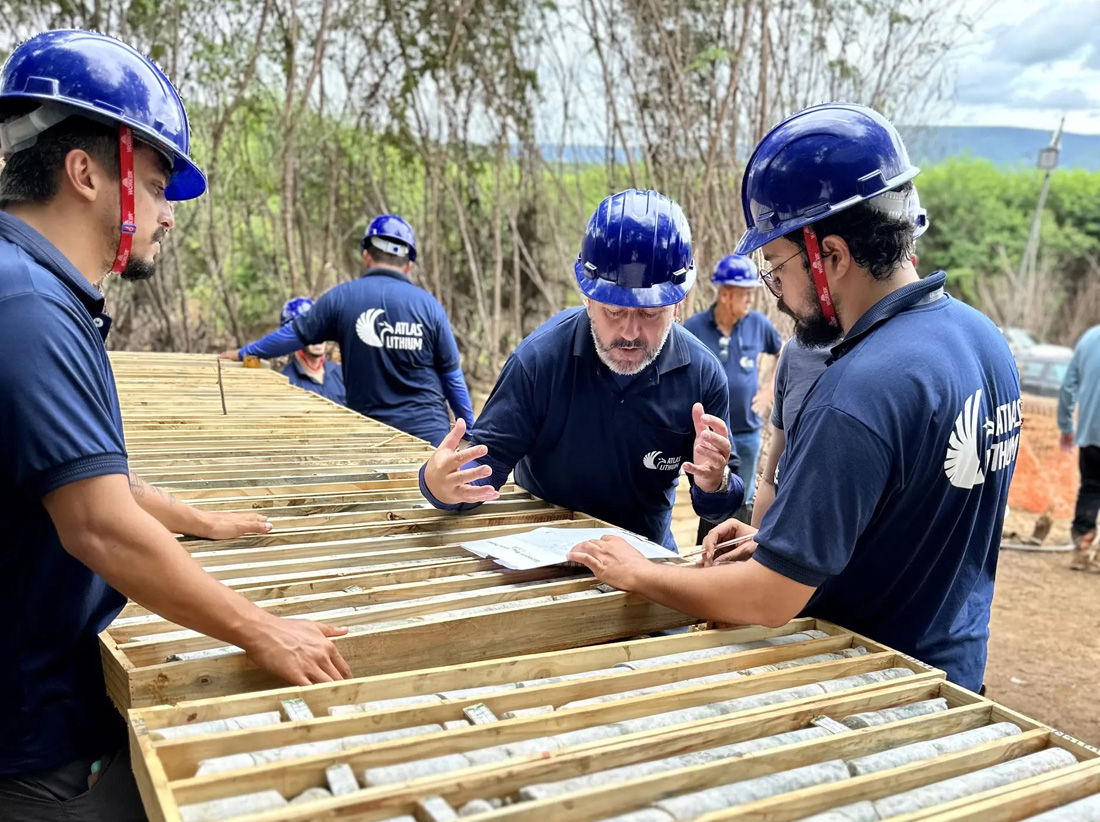High-Ranking US Official Highlights Lithium’s Importance With Visit to Co.’s Brazil Office

U.S. Ambassador Geoffrey Pyatt, Assistant Secretary of State for Energy Resources, visits Atlas Lithium’s corporate office in Brazil. Find out why lithium and other minerals are so critical to the U.S. and important to the energy transition.
A recent visit by U.S. Ambassador Geoffrey Pyatt, Assistant Secretary of State for Energy Resources, to Atlas Lithium Corp.’s (ATLX:NASDAQ) corporate office in Brazil highlights the importance of lithium and other critical minerals in the energy transition.
The West is looking to find friendly sources for lithium, as China currently dominates the market, which is projected to grow from US$2.5 billion in 2023 to US$6.4 billion by 2028 at a compound annual growth rate (CAGR) of 20.4% from 2023 to 2028, according to a report by Markets and Markets.
During a call with reporters after the Brazil visit, where he also met with Brazilian federal officials, Ambassador Pyatt pointed out that Atlas Lithium is taking delivery of its processing plant this summer and expects to be producing by the end of the year.
“So, this is not a sort of hypothetical future project,” Pyatt told reporters. “This is something that is already happening now and with a very strong orientation. Both the capital coming from the United States and including from our NASDAQ investors, but also developing a very explicit linkage to offtake in the United States.”
Last month, Atlas Lithium announced it has made “significant progress” towards lithium concentrate production in Q4 2024 and has substantially expanded its lithium mineral rights footprint in Brazil.
Atlas said it has more than doubled its lithium exploration portfolio in the country’s Lithium Valley to about 539 square kilometers or nearly 54,000 hectares (approximately 133,000 acres), leading the company to believe “it has the largest claim ownership position of any listed company in this new lithium frontier” and the “largest lithium exploration footprint in Brazil.”
To put that in perspective, the company noted the area is nine times the size of Manhattan in New York City.
The company has said its modular dense media separation (DMS) lithium processing plant was in the final stages of fabrication and trial assembly before its shipment to Brazil. The modular processing plant is a key part of its strategy to rapidly advance production at its Minas Gerais lithium project.
‘A Crucial Role’ in US Efforts
While in Brazil, Pyatt met with the ministries for Mines and Energy, External Affairs, and Commerce, as well as the secretariats for National Energy Transition and Planning; Geology, Mining, and Mineral Transformation; and petroleum, natural gas, and biofuels.
He also held discussions with Brazil’s National Electric Energy Agency and the Geological Survey Agency.
“Atlas Lithium’s strategic initiatives in Brazil are not just pivotal for the company but also play a crucial role in the broader context of U.S. efforts to reduce dependence on foreign sources for these vital materials,” wrote Mangeet Kaur Bouns for Benzinga last week.
“We continue to believe Atlas has the potential to enter production in early 2025 and that the release of an initial resource estimate and DFS later this year could serve as significant positive catalysts,” Joe Reagor of Roth MKM wrote. “Therefore, we are maintaining our Buy rating.”
“The expansion of Atlas Lithium’s exploration footprint in Brazil, now encompassing nearly 539 km² (208 square miles), highlights the potential of this region as a significant contributor to the global supply chain of critical minerals. As the world transitions to a greener energy mix, the demand for these minerals is set to skyrocket.”
And it’s not just for environmental sustainability. The strategic importance of the minerals extends to national security and economic development.
“China’s dominance in producing and processing critical minerals may exacerbate these risks, as highlighted by recent geopolitical tensions and trade restrictions,” the Benzinga report said. “To mitigate these vulnerabilities, the U.S. government is focusing on securing supply chains through partnerships and investments in countries rich in critical minerals. With its substantial reserves of copper, lithium, and other critical minerals, Latin America is emerging as a key region for such investments. Brazil, for instance, has the third-largest reserves of rare earths at a staggering 21 million metric tons.”
Pyatt: Consumer Choice the Driver, Not Politics
As Pyatt told reporters after the trip, “The United States own energy transition will only be successful to the extent we are able to identify sources of supply for the vastly increased volumes of materials that we are going to need to power our clean energy transition and the transition in other countries.”
Pyatt also said he believed the transition would move forward regardless of who wins the White House in November.
“It’s being driven by consumer choice,” he said. “It’s being driven by technology. It’s being driven by price competitiveness.”
The Catalyst: Sparking Our Future Energy
Lithium is an important part of electric vehicle (EV) batteries and energy storage systems. It also strengthens alloys, serves as a high-temperature lubricant, and treats bipolar patients.
The consensus among market analysts points to a recovery in lithium prices in the fourth quarter of 2024, Fastmarkets reported.
Katusa Research predicted the lithium market could have a major breakout this year, citing its use in EVs and storage batteries as key drivers.
“The opportunity in lithium is more electric than ever,” Katusa wrote.
The lithium Atlas plans to mine in Brazil is contained within spodumene, a lithium-bearing mineral found in pegmatites or hard rock deposits.
The extraction method employed by Atlas to retrieve lithium concentrate from its mined spodumene consumes considerably less water and offers superior ESG outcomes compared to the extraction of lithium from brines, the company said.
According to the CPRM, or the Brazilian Geological Survey, four lithium-mineralized pegmatite occurrences have been identified within Atlas’ permits, two of which have been confirmed to contain spodumene.
The company said is modular dense media separation (DMS) lithium processing plant is in the final stages of fabrication and trial assembly before its shipment to Brazil’s Lithium Valley. The modular processing plant is a key part of its strategy to rapidly advance production at its Minas Gerais lithium project.
Analyst Joe Reagor of Roth MKM lowered its price target on the stock from US$36 to US$25.50 because of weak lithium prices and the company’s recent decision to delay its initial resource estimate until Q4 2024 and go directly to a Definitive Feasibility Study (DFS).
“We continue to believe Atlas has the potential to enter production in early 2025 and that the release of an initial resource estimate and DFS later this year could serve as significant positive catalysts,” Reagor wrote. “Therefore, we are maintaining our Buy rating.”
Ownership and Share Structure
About 36% of Atlas Lithium is owned by management and insiders. About 13.5% of the shareholders are institutional. The rest, about 50.5%, is retail.
Other top shareholders include Waratah Capital Advisors Ltd. with 4.47%, Mitsui & Co. Ltd. with 12.64%, and Candace Shira Associates LLC with 1.44%, according to Reuters.
Its market cap is about US$166.52 million. It trades in a 52-week range of US$34 and US$9.30.
| Want to be the first to know about interesting Battery Metals, Cobalt / Lithium / Manganese, Critical Metals and Base Metals investment ideas? Sign up to receive the FREE Streetwise Reports’ newsletter. | Subscribe |
Important Disclosures:
- Atlas Lithium Corp. is a billboard sponsor of Streetwise Reports and pays SWR a monthly sponsorship fee between US$4,000 and US$5,000.
- As of the date of this article, officers and/or employees of Streetwise Reports LLC (including members of their household) own securities of Atlas Lithium Corp.
- Steve Sobek wrote this article for Streetwise Reports LLC and provides services to Streetwise Reports as an employee.
- This article does not constitute investment advice and is not a solicitation for any investment. Streetwise Reports does not render general or specific investment advice and the information on Streetwise Reports should not be considered a recommendation to buy or sell any security. Each reader is encouraged to consult with his or her personal financial adviser and perform their own comprehensive investment research. By opening this page, each reader accepts and agrees to Streetwise Reports’ terms of use and full legal disclaimer. Streetwise Reports does not endorse or recommend the business, products, services or securities of any company.
For additional disclosures, please click here.
link

:strip_icc()/i.s3.glbimg.com/v1/AUTH_37554604729d4b2f9f3eb9ad8a691345/internal_photos/bs/2024/x/h/IBNV1ASuCf4BpCclN7Dg/05992260aa8a482dbe25803f95fdd940-0-25e9d7a0af2c41dc952d18da2e9359a3.jpg)



